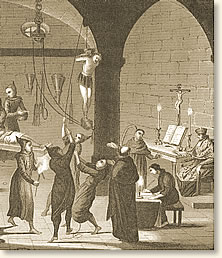Father John Gerard was a spy. In November 1588 he was among a team of four Jesuit priests sent from Rome and secretly landed on the shores of England with the mission of making contact with and ministering to that country's Roman Catholic community. He joined a clandestine network of Catholic operatives controlled from their headquarters in London.
Born in England, Father Gerard mingled easily among English society, passing himself off as a gentleman of leisure. It was a
dangerous existence; as evidenced by the fact
that Father Gerard's three companions in the landing party were eventually discovered and executed. Gerard remained undetected for six years until his betrayal by a servant in a household in which he was staying.
After three years in captivity he was taken to the Tower of London where he was subjected to torture in an effort to force him to confess that his mission was to overthrow Queen Elizabeth and to reveal the identity of the leader of the spy ring. Despite the pain, he refused to divulge any information. On the night of October 4, 1597 he made a daring escape from the Tower with the help of friends on the outside. He slipped into the English countryside and remained undiscovered for another eight years.
Finally, with the attempt to blow up Parliament and the discovery of the Gunpowder Plot in 1605, the political atmosphere became too dangerous. Father Gerard slipped out of the country and sailed to the European continent disguised as a member of the Spanish diplomatic mission.
Torture
Father Gerard wrote a book detailing his adventures shortly after his escape to Europe. He describes his torture in the Tower of London:
"We went to the torture room in a kind of procession, the attendants walking ahead with lighted candles.
The chamber was underground and dark, particularly near the entrance. It was a vast place and every device and instrument of human torture was there. They pointed out some of them to me and said I would try them all. Then he asked me again whether I would confess.
'I cannot,' I said.
I fell on my knees for a moment's prayer. Then they took me to a big upright pillar, one of the wooden posts which held the roof of this huge underground chamber. Driven into the top of it were iron staples for supporting heavy weights. Then they put my wrists into iron gauntlets and ordered me to climb two or three wicker steps.
My arms were then lifted up and an iron bar was passed through the rings of one gauntlet, then through the staple and rings to the second gauntlet. This done, they fastened the bar with a pin to prevent it from slipping, and then, removing the wicker steps one by one from under my feet, they left me hanging by my hands and arms fastened above my head. The tips of my toes, however, still touched the ground, and they had to dig the earth away from under them. They had hung me up from the highest staple in the pillar and could not raise me any higher, without driving in another staple.
Hanging like this I began to pray. The gentlemen standing around me asked me whether I was willing to confess now.
'I cannot and I will not,' I answered.
But I could hardly utter the words, such a gripping pain came over me. It was worst in my chest and belly, my hands and arms. All the blood in my body seemed to rush up into my arms and hands and I thought that blood was oozing from the ends of my fingers and the pores of my skin. But it was only a sensation caused by my flesh swelling above the irons holding them.
The pain was so intense that I thought I could not possibly endure it, and added to it, I had an interior temptation. Yet I did not feel any inclination or wish to give them the information they wanted. The Lord saw my weakness with the eyes of His mercy, and did not permit me to be tempted beyond my strength. With the temptation He sent me relief. Seeing my agony and the struggle going on in my mind, He gave me this most merciful thought: the utmost and worst they can do is to kill you, and you have often wanted to give your life for your Lord God. The Lord God sees all you are enduring - He can do all things. You are in God's keeping.
With these thoughts, God in His infinite goodness and mercy gave me the grace of resignation, and with a desire to die and a hope (I admit) that I would, I offered Him myself to do with me as He wished. From that moment the conflict in my soul ceased, and even the physical pain seemed much more bearable than before, though it must, in fact, I am sure, have been greater with the growing strain and weariness of my body...
Sometime after one o'clock, I think, I fell into a faint. How long I was unconscious I don't know, but I think it was long, for the men held my body up or put the wicker steps under my feet until I came to. Then they heard me pray and immediately let me down again. And they did this every time I fainted - eight or nine times that day - before it struck five...
A little later they took me down. My legs and feet were not damaged, but it was a great effort to stand upright..."
References:
Father Gerard's account appears in Gerard, John, The Autobiography of an Elizabethan (1951); Dods, A.H., Elizabethan England (1973); Youings, Joyce, Sixteenth Century England (1984).

